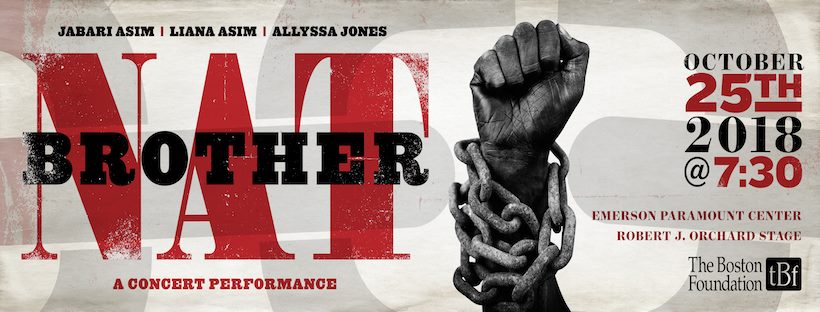 Presented by The Boston Foundation
Presented by The Boston Foundation
Book and Lyrics by Jabari Asim and Liana Asim
Music by Allyssa Jones
Music Director Damien Sneed
October 25, 2018
Emerson Paramount Center
Robert J. Orange Stage
559 Washington Street
Boston, MA 02111
Brother Nat on Facebook
Critique by Diana Lu
(Boston, MA) American history is black history, is slave history. It is a history that demonstrates the deepest stoicism and power of humanity. Beaten and chained, stripped of everything, Black American slaves formed communities tighter than blood, turned lifetimes of suffering into exquisite song, and used song to rise above, revolt against injustice, and redeem all humanity. Nat Turner’s Rebellion was a point of inflection in our nation’s story, which swung the course of history toward freedom and salvation. A grand opera is needed to deliver this epic. No other medium could do justice.
This one-night only concert performance of Brother Nat was spectacular. Allyssa Jones’ music was prodigious and stunning. There were 27 original songs, in a kaleidoscopic array of styles, none of them reprisals. I am astonished that a team of three could produce such a polished opus in America today, with such little money allocated for the arts. The greatest musical masterpieces can hardly compare.
All the songs were deeply affecting and had catchy refrains. Particularly, “House Negro Blues”, sung by Joshuah Brian Campbell, dramatized such poignant longing from a perspective that is rarely depicted, but that is achingly relatable. I also appreciate how the white characters sung in classical styles while the black characters’ songs were influenced by gospel to jazz to blues to rockabilly and pop ballads. Hearing the contrasting styles, it really hits home that nearly all modern popular music was appropriated from Black culture.
I want this to become an epic three-hour musical because it can surely rival Les Miserables. I want the story to just as grand and sweeping, with deeper portrayals of more of the characters in the ensemble and their relationships and struggles.
I felt that the white characters were humorous and game, but didn’t add much to the story and unnecessarily took the focus away from the black characters. Everybody, and I mean everybody, in the world knows about the horrors of American slavery even if they don’t want to acknowledge the direct social, political and economic ramifications of that shameful legacy to this day. The slave owners’ perspectives don’t need to be rehashed onstage.
The only interesting white perspective was that of the French character, Sans-Souci, hilariously played by Mark Linehan. At the time of the Nat Turner Rebellion, Britain was well on its way to abolishing slavery, decades before the US. It’s wild to see that the rest of Europe thought the establishment so abhorrent. These were societies in the middle of colonial expansion and genocide, and even they thought American slavery was too brutal. That’s really saying something.
Hamilton was playing at the Boston Opera House next door, and its success shows that there is no excuse not to have an all POC cast. I’d much rather the stage be given to more of the slave characters, especially the women. That their heroism and bravery are ignored by history is a travesty, especially considering they probably knew that they would likely be the ones to suffer the most in the ensuing massacre.
This performance presented a bird’s-eye view of the lead-up to the rebellion, but I wanted deeper dives into the inner lives of the ensemble characters as well. I wanted closer examination of the love between Nat and Cora, Vyrie and Will, longing for mothers’ stolen children, even the Overseer’s internalized racism. I would love to see Brother Nat become that story. I firmly believe that story can and should become a true American masterpiece.
Jabari and Liana Asim are on the incredible journey of telling one of the most crucial stories of America. It belongs on Broadway and in the great works canon. I am so blessed to be able to witness the production process. It is witnessing history in the making.
